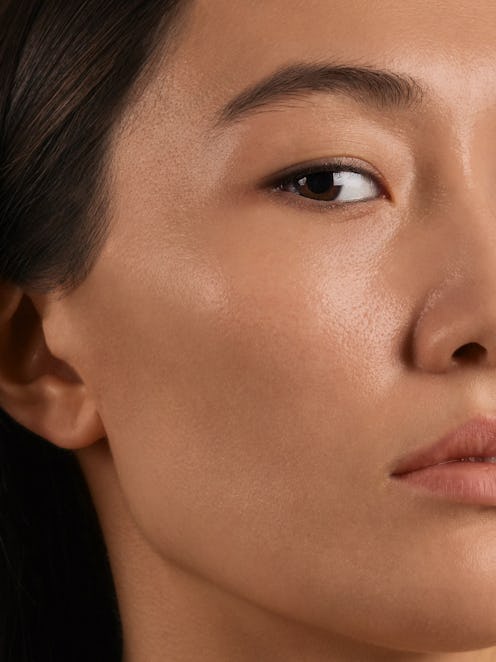(Skin)
Inflammaging Is The Latest Focus In Skin Aging
Dermatologists explain why you should care.

If “inflammaging” hasn’t found a place in your skin care dictionary yet, write it down now. A mashup of inflammation and aging, this buzzword initially referred to inflammation’s overall effect on health — more commonly used in the wellness space than among dermatologists. While it’s been circulating quietly for a few years among beauty enthusiasts, it’s now making its way to the forefront of your routine. DEINDE, a newly launched skin care brand designed to specifically target inflammaging, is proof.
“I foresee inflammaging management will soon be as commonplace as proper sunscreen protection, skin barrier management, or maintaining a healthy microbiome,” says Dominique Gagnon, VP of brands at DEINDE. Gagnon believes that studying the effects of inflammaging “adds a missing puzzle piece to the conversation of rising environmental stressors and how they trigger damage to the skin.” And she isn’t alone in taking note. Below, dermatologists break down everything you need to know about inflammaging’s role in skin aging, from common causes to the best products to combat it.
What Is Inflammaging?
Whether we’re talking about full-body inflammaging or the skin-specific kind, inflammaging refers to inflammation that’s “low-grade, chronic, and linked to the process of aging,” says Dr. Dendy Engelman, M.D., a board-certified cosmetic dermatologist and Mohs surgeon at New York’s Shafer Clinic. According to Dr. Engelman, inflammation alone often comes with “a very quick trigger and response relationship.” In contrast, inflammaging occurs as a result of chronic, low-grade inflammation.
What Causes Inflammaging?
To pinpoint the cause of inflammaging, you have to look at both intrinsic and extrinsic factors, says Dr. Rebecca Marcus, M.D., a board-certified dermatologist in Dallas and founder of Maei MD. These can include “hormonal changes, genetic factors, environment, exposure to UV rays and free radicals, diet, and lifestyle.” According to Dr. Engelman, common causes can also include “stress on the immune system over time, cell and immune system deterioration, and an imbalance of intestinal microorganisms.”
The accumulated effects will start to manifest, “as early as 30,” says Dr. Engelman. Gagnon echoes this, referencing DEINDE’s data, which suggests that inflammaging shouldn’t be a concern until after the age of 25. That doesn’t necessarily mean that everyone will start experiencing inflammaging in their 30s. Dr. Engelman says it can occur at any stage of life and may be caused by a variety of factors, including the aforementioned ones above.
How Does Inflammaging Affect Skin?
As you’re exposed to low-grade inflammation over time, derms say it accelerates visible signs of aging, causing a loss in collagen, hyaluronic acid, and other essential molecules in your skin. “It also impairs the skin barrier’s ability to function optimally, which can allow other aggressors like bacteria and free radicals to have a more substantial effect,” says Dr. Engelman. This can manifest visually in brown spots, fine lines, wrinkles, and sagging skin,
Dr. Marisa Garshick, M.D., a board-certified dermatologist in New York and assistant clinical professor of dermatology at Cornell New York-Presbyterian Medical Center says that “inflammaging may also contribute to background redness as well as dullness and dryness.” You’ll also see it manifest in skin conditions including “acne, psoriasis, and dermatitis,” adds Dr. Engelman.
How To Treat Inflammaging
Inflammaging has both internal and environmental causes, so you need to treat it twofold. “Since inflammaging is due in part to factors that change with age, it cannot be prevented entirely,” says Dr. Marcus. “However, extrinsic factors can be somewhat controlled and mitigated.”
From a wellness perspective, the biggest step is to reduce your stress levels — at least as much as you can. “It’s easier said than done, but it’s a key way to treat inflammaging,” says Dr. Engelman. Other lifestyle tips include eating a healthy diet, exercising regularly, and making sure you’re getting enough sleep. If that all sounds like a New Year’s resolution that’s likely to waver beyond January, there are things you can do on the skin care side, too.
“Treating the signs of inflammaging is similar to treating other signs of skin aging using antioxidants, retinoids, exfoliating acids, hydrating products, and in-office procedures,” says Dr. Garshick. “Since the skin changes that come with inflammaging may be similar to those we see with the natural aging process, the treatments are similar.” One caveat: You don’t want your inflammaging treatments to trigger additional inflammation or irritation, so make sure the products you use are gentle enough for your skin type. Along with popular line-smoothing ingredients like retinoids and acids, Dr. Garshick also recommends incorporating hydrating ingredients like glycerin and hyaluronic acid, as well as barrier-strengthening formulas.
All three dermatologists also recommend making sure your routine is stocked with some form of antioxidants, like vitamin C. “This is excellent for fighting free radical damage and protecting the skin against external aggressors, which can contribute to or exacerbate the effects of inflammaging,” says Dr. Engelman. She also recommends calming formulas that include ingredients like niacinamide, green tea, and aloe.
“Hydrate the skin, wear sun protection, and use topical antioxidants to help protect against free radical damage,” says Dr. Garshick. “As we learn more about inflammaging, consider ingredients that target this specifically as well.”
The Best Skin Care Products To Combat Inflammaging
This article was originally published on